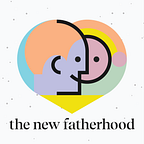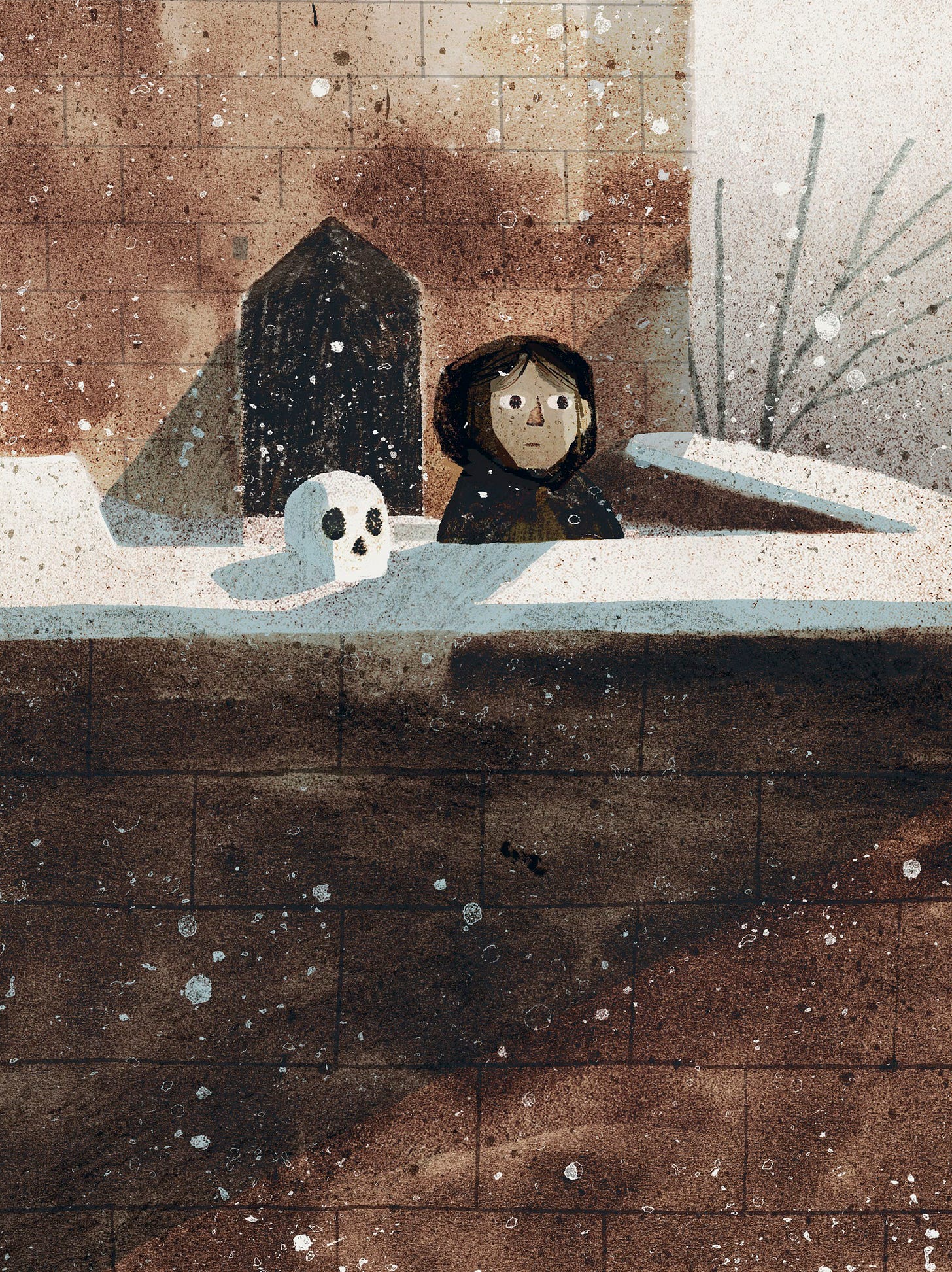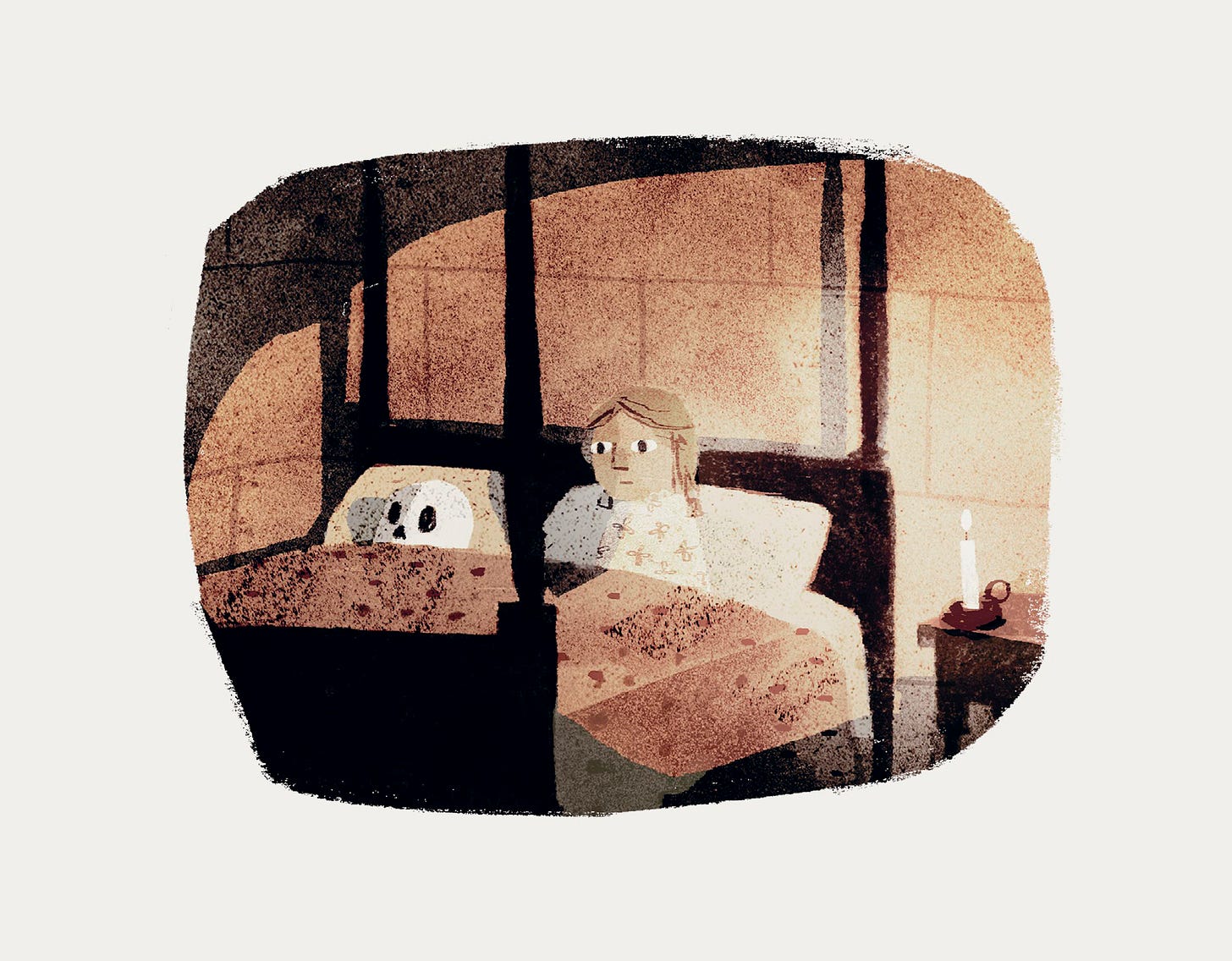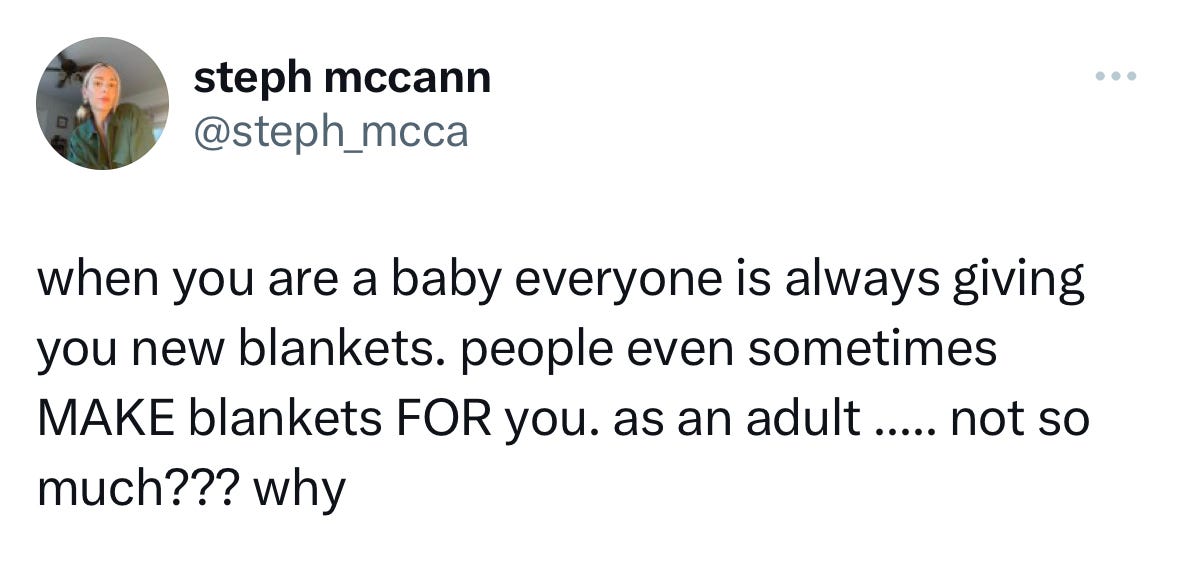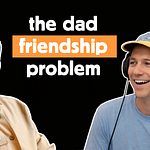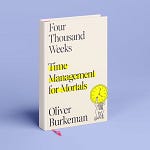The New Fatherhood is a yadda-yadda-yadda. This is the last newsletter before I shut up shop for August. I’m excited to share the second episode of the podcast, where I’m talking to an all-time favourite: kids’ author and illustrator Jon Klassen.
Listen to the podcast, read the companion essay, or why not both?
Now, where did I put that hat?
“Read to your kids.”
It’s something all new parents will hear, and for good reason: it has an outsized impact on their cognitive development. Research has shown increased activity in brain regions related to language when children listen to their parents read; they pick up vocabulary, grammar, phrasing and intonations they don’t encounter in regular conversations. One study found that young children who are read to regularly will be exposed to at least 300,000 more words by the time they start school, and depending on how often you read (and the books you choose), that number could end up over a million.
So it’s good for them. Of course. But it’s good for you too. Every bedtime story is an intimate performance for an audience of one. These books allow us to conjure universes for our kids, transforming their bedrooms into other worlds, inviting them to venture down the rabbit hole—an apt idiom here, I’m sure you’ll agree—to see what lies beneath. Stories are our most potent tool in transmitting, retaining and passing down information. They’re how we make sense of the world and our place in it. They help our children to do the same.
So don’t just read to your kid because the research tells you to. Do it because it’s one of the most magical things you can do with—and for—them. Like so much of parenting, if we approach it as something we should do—like eating five portions of veg a day—we’ll see it as a chore and not for the encapsulation of joy it offers. Never mind that it’s the best way to help them forge a lifelong habit (and love) of reading, and who doesn’t want that?
So you’ll need the right attitude. But you’ll also need a great book. And in this house, none are held in higher regard than those of Jon Klassen. I Want My Hat Back, published in 2011, was his first solo picture book, and it’s been on regular rotation for many years. It was followed up with an additional pair in a series that has become informally known as The Hat Trilogy. I once read them with my eldest; I was reading them with my youngest just last night. They sit high on my list of “Books I will miss reading to my kids when they get too old for it.” I buy the trilogy as a gift for my closest friends when their kids reach the right age—which I tend to think is their third birthday, but you may feel different.
The shelves are littered with moral-heavy books—blunt instruments that attempt to teach essential topics to help our kids navigate the world. But Klassen’s work is different. The Hat Trilogy explores the moral ambiguities around subjects like sharing and friendship in a nuanced way, with morally dubious characters and storylines that operate on different levels: enjoyable for young children before beginning to gently introduce them to deeper emotional territory (when they’re ready for it). The characters are simple but expressive, with eyes that impart intentions and betray mistruths. His books are delivered in a tone and cadence that invites play: between parent and child, and a child and their imagination.
I spoke to Klassen earlier this year in anticipation of his fifth solo book The Skull, which rocketed to #1 on the New York Times Picture Book Bestseller List on its release. It’s an achingly beautiful retelling of a traditional Austrian folktale and continues his uncanny ability to create spaces that feel inviting yet uncomfortable. This time the format has shifted to somewhere between a picture book and a chapter book, leaning older than his previous works, whilst losing none of the subtle brilliance that runs through the DNA of his output. Its influences span from classic tales to the late Cormac McCarthy’s magnum opus Blood Meridian, with certain sections reminiscent of Fumito Ueda’s haunting videogame Ico. In short: it’s a remarkable evolution of his unique storytelling style.
I spoke to him from his home in New York earlier in the summer. We talked about how his books have passed into popular parenting culture, his creative process (and how he used his kid’s Lego blocks to help him illustrate this new book) and the importance of creating a safe space for kids to explore complex emotions. He dialled in from a dark loft, which felt suitably creepy and very on-brand for this new book.
Klassen’s books invite the listening child into a world of intrigue, keeping them riveted while commanding the attention of the parent who guides them through. How does he thread that needle? “Your main job is to stay interested,” he offers. “Because if you're not interested, they can smell it. They'll smell you a mile away: ‘If you are bored, we are bored.’”
Boredom is the furthest thing from my kids’ minds when we’re lost in his books. I Want My Hat Back comes with a phalanx of supporting characters: a fox, a frog, a bear, a rabbit, a turtle, a snake, and an armadillo. Each is voiced by a different regional accent from the UK whenever we read it at home. The rabbit—spoiler alert, the story's antagonist—has a Geordie accent. “Ha! The rabbit is always from Newcastle over there.”
Where is the rabbit from in his reading? “I'm not a very enthusiastic reader of my own books when I read them out loud. I read them like legal documents. I always feel bad because people come to the events and they're like, “Well, this must be the best reading of this book; he wrote it!” and it's not by a longshot even the best reading they've ever heard from their parents, librarians, or whoever else is doing a good job. I’m much more of the reader I’d like to be with other people’s books.”
Too many stories for young audiences take a heavy-handed approach to exploring important subjects. But the Hat Trilogy delights in exploring the grey areas. “I liked when things were more ambiguous, and they weren't all tied up … the characters are more complicated and interesting.” I was reading Klassen’s books to my son for a while before he realised a common theme—in two-thirds of the trilogy—is one animal eating another. Is it OK to eat someone because they took your hat? Does that make a character unredeemable, or is retribution justified?
“Books about villains and heroes never really interested me,” Klassen offers. “And they don't now either. But it's books about people who are saying, ‘I shouldn't be doing this. Why am I doing this?’ That kind of feeling was so resonant with me as a kid because that was so often the case—you find yourself doing something that you're not on board with at all. But here you are doing it.”
Klassen’s books have become a shorthand for exploring complex emotions for kids and adults alike. I told him about a recent situation where one friend wasn’t telling the whole truth, and I jokingly accused them of giving off big “I haven’t seen a rabbit wearing a hat” energy. Klassen laughs. “My favourite part of that book is how much it's travelled. Every now and then, you hear kids and parents use it as a shorthand for lying or being sneaky, but not in a very clever way—overly overdoing it.” Klassen recently caught Trump being interviewed on the news before shutting it down by echoing a line in the book: Don’t ask me any more questions. “It was like a field goal in my house. I couldn’t believe he actually said it.”
Before becoming a children’s author, Klassen worked on movies including Coraline and Kung Fu Panda, an experience that came in useful for The Skull. “I wanted the scale of it to feel cinematic, and I had drawn like that before but it had been a minute.” (Over a decade, according to his IMDB.) “I had to make little Lego sets of the rooms, photographing them with my phone as a starter for the drawings.” Klassen shared a few of these photos on his Instagram earlier this month.
He returned to the screen, albeit in a smaller format, earlier this year with Shape Island, a new series featuring a voice cast composed of 30 Rock, Community and What We Do in the Shadows alumni. “The show was in development for ages. We had a deal initially, and it fell through. And so we were discouraged and thought, ‘At least we can make books with these guys that we've been working on for so long.’”
I tell him that Triangle, one of these books, is another favourite in our house and that Shape Island has become a regular on the TV too. “That's so nice to hear it. We were a bit further removed than we normally are because there were so many people involved in this show. It was steering a giant ship rather than a little sailboat. And we weren't even really steering, but they gave us a little steering wheel that didn't do much.” I suggest the wheel might be akin to the plastic one you give a toddler in the backseat of the car, so they will keep quiet and can pretend they’re driving. He does the same thing with his kids when they’re playing Mario Kart together.
The universes he creates inside his books, both on his own and with frequent collaborator Mac Barnett, are equal parts inspiration and exploration. Adventure, intrigue, and mystery are ever-present in the watercoloured worlds he invites children into. “As a kid, you imagined whole worlds around your books and how they felt inside. Only so much has to do with you as a creator—you're prompting these amazing imagination machines. It's so rich; these kids are living in their heads in this huge way.”
The Skull journeys into a new world and follows Otilla, a small girl who escapes a cold, dark forest and arrives at an old house, meeting the titular skull. With every page, the book raises more questions than answers as Otilla and the skull investigate the house's history and inhabitants. It imparts the importance of looking out for those around us, especially any finding it hard to look after themselves. It implores us to avoid taking rash decisions on others because of preconceived notions, but presses decisive action when required. It’s filled with tiny visual gags that reward re-reading: whilst there’s nothing about hats here, there’s a great moment with masks that brings a smile to all of our faces when we read it.
This book finds Klassen trying something new—retelling an Austrian folktale rather than creating a new story from a blank slate. During the Alaskan leg of a book tour, he found himself flicking through a kid’s book whilst waiting for the event to start and happened upon the story. It seemed to activate something and wouldn’t let go. “Even on the flight home, I kept thinking about it.” A year later, he contacted the library, asking if anyone there could locate the book. A PDF was in his inbox within a few hours, but Klassen was surprised it wasn’t quite how he remembered it. “I had changed it in my head. The second half was totally different.”
I wonder how this experience happens more often than we expect, and how it shapes our lives. “That’s how memory works. You go back to books that affected you as a kid and find them again, and they’re different. It makes you wonder what else has altered over the years. Whatever you're going through at the time, all that stuff filters into how you're changing these stories in your head. It's very interesting and intimate. It strikes me as hopeful, the way we change these stories for ourselves.”
I wonder aloud: where is the hope?
“There's a gentleness of it. But it's also therapeutic. Whatever you're preoccupied with in your own life comes through your stories. Whatever comes out—it sounds hokey, and I don't think I would have believed this as a 25-year-old—is not up to you. You're roughly banging out what you have control over, but the main thing is unconscious. And that doesn't mean it's not yours—but you're still holding the plastic steering wheel, to an extent.”
Buy The Skull on Amazon, Bookshop.org or via your local indie bookstore.
Good Dadvice
Previously on The New Fatherhood
If you’re searching for a good book (or three), there is no shortage in last week’s open thread. I added half a dozen to my list, including Mary Karr’s Lit, Emma Cline’s The Guest, David Grann’s The Wager, Justin Cronin’s The Ferryman and Pádraig Ó Tuama’s Poetry Unbound.
You’re a well-read bunch of dads. I’m looking forward to tackling a few of them in August when I will be as offline as humanely possible.
Say Hello
How did you like this week’s issue? Your feedback helps me make this great.
Loved | Great | OK | Meh | Bad
If you prefer your podcast in other places, The New Fatherhood is available on Apple Podcasts, Spotify, Overcast, Pocket Casts and Amazon Music.
Branding by Selman Design. Illustration by Jon Klassen. Audio production by Max McCabe. Survey by Sprig. Did I tell you I’m not going to be around next month? I might have mentioned it. See you in September, when I will be days away from lovingly launching my children through the school gates once more.


